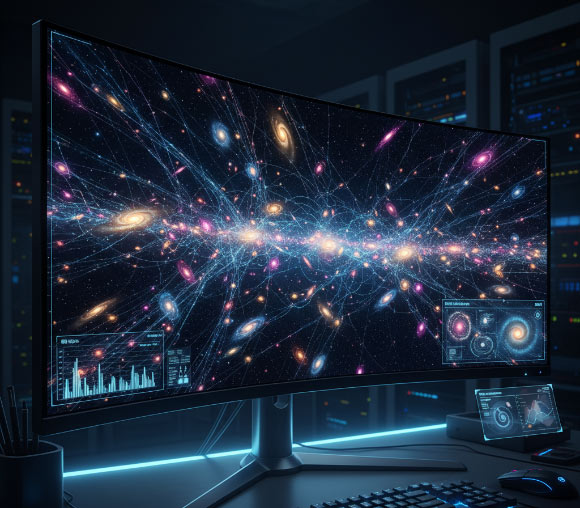A team of physicists from Canada, the United States, the United Kingdom and Italy has mathematically shown that our Universe is built on a type of understanding that exists beyond the reach of any algorithm.
Faizal et al. show that the fundamental nature of reality operates in a way that no computer could ever simulate. Image credit: Gemini AI.
“It has been suggested that the Universe could be simulated,” said Dr. Mir Faizal, a physicist at the University of British Columbia Okanagan.
“If such a simulation was possible, the simulated Universe could itself give rise to life, which in turn might create its own simulation.”
“This recursive possibility makes it seem highly unlikely that our Universe is the original one, rather than a simulation nested within another simulation.”
“This idea was once thought to lie beyond the reach of scientific inquiry.”
“However, our recent research has demonstrated that it can, in fact, be scientifically addressed.”
“Our research hinges on a fascinating property of reality itself.”
“Modern physics has moved far beyond Newton’s tangible ‘stuff’ bouncing around in space. Einstein’s theory of relativity replaced Newtonian mechanics. Quantum mechanics transformed our understanding again.”
Today’s cutting-edge theory — quantum gravity — suggests that even space and time aren’t fundamental. They emerge from something deeper: pure information.
“This information exists in what physicists call a Platonic realm — a mathematical foundation more real than the physical Universe we experience. It’s from this realm that space and time themselves emerge.”
The authors demonstrated that even this information-based foundation cannot fully describe reality using computation alone.
They used powerful mathematical theorems — including Gödel’s incompleteness theorem — to prove that a complete and consistent description of everything requires what they call non-algorithmic understanding.
“Think of it this way. A computer follows recipes, step by step, no matter how complex. But some truths can only be grasped through non-algorithmic understanding — understanding that doesn’t follow from any sequence of logical steps,” they said.
“These Gödelian truths are real, yet impossible to prove through computation.”
“Here’s a basic example using the statement, This true statement is not provable.”
“If it were provable, it would be false, making logic inconsistent. If it’s not provable, then it’s true, but that makes any system trying to prove it incomplete. Either way, pure computation fails.”
“We have demonstrated that it is impossible to describe all aspects of physical reality using a computational theory of quantum gravity,” Dr. Faizal said.
“Therefore, no physically complete and consistent theory of everything can be derived from computation alone.”
“Rather, it requires a non-algorithmic understanding, which is more fundamental than the computational laws of quantum gravity and therefore more fundamental than spacetime itself.”
“Since the computational rules in the Platonic realm could, in principle, resemble those of a computer simulation, couldn’t that realm itself be simulated?”
“No. But our work reveals something deeper.”
“Drawing on mathematical theorems related to incompleteness and indefinability, we demonstrate that a fully consistent and complete description of reality cannot be achieved through computation alone.”
“It requires non-algorithmic understanding, which by definition is beyond algorithmic computation and therefore cannot be simulated. Hence, this Universe cannot be a simulation.”
According to the team, the findings have profound implications.
“The fundamental laws of physics cannot be contained within space and time, because they generate them,” said Origin Project Foundation researcher Dr. Lawrence M. Krauss.
“It has long been hoped, however, that a truly fundamental theory of everything could eventually describe all physical phenomena through computations grounded in these laws.”
“Yet we have demonstrated that this is not possible. A complete and consistent description of reality requires something deeper — a form of understanding known as non-algorithmic understanding.”
“Any simulation is inherently algorithmic — it must follow programmed rules,” Dr. Faizal said.
“But since the fundamental level of reality is based on non-algorithmic understanding, the Universe cannot be, and could never be, a simulation.”
The study was published in the June 2025 issue of the Journal of Holography Applications in Physics.
_____
Mir Faizal et al. 2025. Consequences of Undecidability in Physics on the Theory of Everything. Journal of Holography Applications in Physics 5 (2): 10-21; doi: 10.22128/jhap.2025.1024.1118

